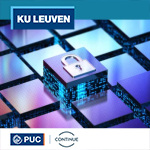This session is aimed at IT professionals and developers
Cyber Resilience | Post-quantum cryptography
session 8
Intro
Even though Quantum Computing systems are not yet powerful enough today to pose a real threat to our cryptography, criminal organisations are suspected of applying the principle of 'harvest today, decrypt later,' with all the dangers it poses to our critical infrastructure, official contracts, digital signatures, news reliability, and other vulnerabilities. In this session, we delve into 'Quantum-Safe' and 'Post-Quantum Cryptography' as defensive measures against these threats, which receive significant attention, particularly in the financial, telecommunications, energy, and government sectors. We explain how to establish a 'Quantum-Safe Implementation' project and which state-of-the-art technologies can lend a hand in this process.
Lecturer
Eric Michiels
read more… less…Standard price
260 euro
›Target audience
›Program
This session, which focuses on the post-attack phase, is part of an overview course on cybersecurity.
›Organization
This programme is organised by PUC - KU Leuven Continue and the IT working group.
›Practical
Date and location
18th November 2025
Session takes place from 14:00 - 17:00
KU Leuven - Campus Rabot (Gebroeders de Smetstraat 1, 9000 Gent).
Registration
Register online before 04/02/2025
The cost per session is € 260. The deadline for registration is 5 working days before start of the session.
Pay by bank transfer to account number IBAN BE31 2850 2133 2955 of PUC - KU Leuven Continue, stating '400/0026/67943 + name of participant(s) and do not receive an invoice.
If you would like an invoice, please indicate this when registering.
NEW: SME-wallet: Increased support for energy transition and cybersecurity
Starting April 1, 2023, small and medium-sized enterprises (SMEs) can receive a higher percentage of support for training or advice within the theme of 'cybersecurity'. Small enterprises will receive 45% support, while medium-sized enterprises will receive 35%.




